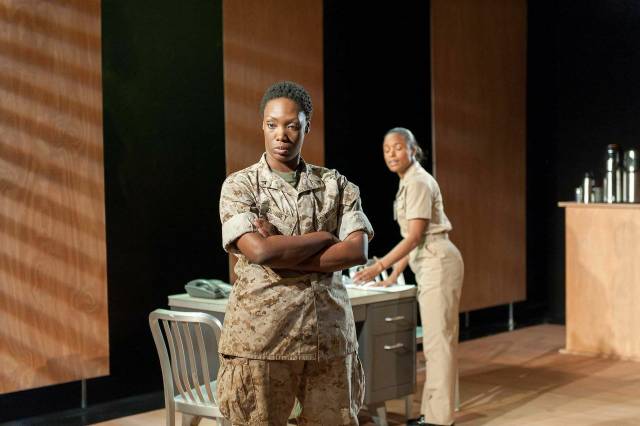

For a play that features three vets dealing with issues ranging from PTSD to sexual assault, Rehana Lew Mirza’s Soldier X is surprisingly buoyant. It begins with recent recruit Lieutenant Monica Burnes trying to get veteran Lance Corporal Lynn Downey to talk about “re-entry.” Downey’s inability to articulate in the face of a wide-eyed recruit’s rehearsed script draws uncomfortable laughter from the crowd. This is how Mirza draws us in. The scene opens with a joke, easing us into a world we would rather not step into, and ends with an emotional punch.
These shifts, between light and dark, come alive when they are being hinted at the least. The exchanges between Downey and Burnes, used primarily as a framing device for the main plot (more on this later), are the most memorable scenes. Carolyn Michelle Smith lands the meatiest role with Downey and performs with relentless precision, displaying both comic timing and dramatic restraint. Her Downey is haunted, yet charismatic and a welcome contrast to the play’s protagonist, Monica Burnes. Played by Kaliswa Brewster, Burnes is placed on one end of a love triangle with another recently returned vet, Jay (Jared McNeill), and a deceased Muslim soldier’s sister, Amani (Turna Mete). How the love triangle unfolds forms the main crux of the story.
Mirza has taken some laudable risks here: there’s not much focus on identity politics (consider the title), on defining terms like “cultural Muslim” or on reflections on being black in the military. Stepping beyond those themes, Mirza is interested in a different conversation about the effects of war on an entire generation. Lucie Tiberghien’s no fuss direction here aids the conversation the text wants to have, the bare pale-wooded set by Daniel Conway delivers a clinical atmosphere for it and the sound design by Broken Chord appropriately punctuates when needed.

When it comes to the actors engaging in the conversation, Brewster as Burnes is given a tall order. The least experienced of the vets and not reeling with the loss that connects Amani and Jay, Brewster doesn’t sell us on why Burnes falls for Jay, making the love triangle appear forced. Once a scene about her family comes to play, Brewster finds the claws she needs to dig into character. McNeill as Jay manages much better, relying on his affability to get us on his side. He stumbles when the darker moments surface, as does the ensemble, but he draws an empathetic character in Jay, his flaws and charms readily visible, even if not fully explored.
It’s at the end of the play that the incomplete exploration is more present, and the final scenes feel a little contrived, especially the message tacked on for our token millennial, but overall, this is an important play, one that works on the audience in unexpected ways. Since 1989, Ma-Yi Theater Company has been putting new Asian-American voices at the forefront and Soldier X is another accomplishment in their long, illustrious history.